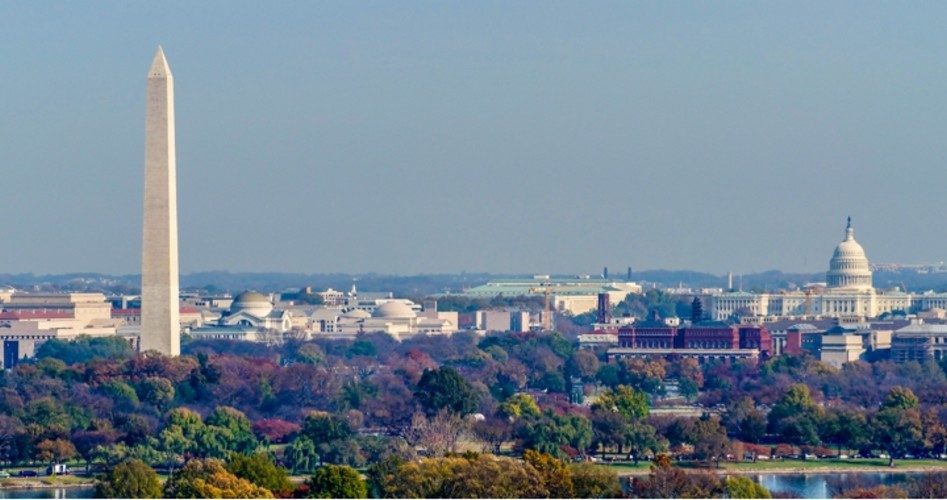
Leftist ideas about eliminating the Electoral College or packing the courts may seem to epitomize total lust for power, but they’re nothing compared to a more recent proposal: to “Pack the Union.” The scheme, laid out in the supposedly prestigious Harvard Law Review, advocates reducing Washington D.C.’s size to just a few federal buildings and then turning the city’s 127 neighborhoods into states. With the area being a Democrat stronghold, this would add 254 far-left senators and 127 far-left representatives to Congress.
This would enable the Left to alter the Constitution virtually at will, something the Review complains is currently too difficult to allow for fundamental change.
The anonymously written essay, “Pack the Union: A Proposal to Admit New States for the Purpose of Amending the Constitution to Ensure Equal Representation,” expresses the idea that “the loss of Hillary Clinton in the 2016 presidential election despite having won more popular votes than incumbent Donald Trump; a Senate where the ‘majority’ represents about 15 million fewer people than the ‘minority’ and a Supreme Court where two justices were nominated by the president having less popular votes and confirmed by that Senate” has “raised concerns over America’s democracy,” Meaww.com reports, summarizing.
The Review writes that the 127 new states “could be added with a simple congressional majority,” and statehood does poll well in D.C., so local opposition would likely be no impediment. (Note, however, some observers “argue statehood would also require a constitutional amendment, since, among other reasons, DC is mentioned in the 23rd Amendment,” relates Vox.)
As for its goals, the Review states that the scheme “would add enough votes in Congress to ratify four amendments: (1) a transfer of the Senate’s power to a body that represents citizens equally; (2) an expansion of the House so that all citizens are represented in equal-sized districts; (3) a replacement of the Electoral College with a popular vote; and (4) a modification of the Constitution’s amendment process that would ensure future amendments are ratified by states representing most Americans.”
Expanding upon the last point, the Review later admits that its aim is to remove “the Influence of States in the Amendment Process.” This “fourth and final amendment,” it explains, “would ensure that these changes could not be undone by an opposition Congress following the same playbook.”
Of course, what the Review doesn’t say is that constitutional changes would no doubt go far beyond the four outlined amendments. For starters, the Second Amendment would certainly be nixed, and “hate speech” (as defined by the Left) exceptions and curtailment of religious freedom (to prevent resistance against the “LGBTQ” agenda) would assuredly be added to the First.
In fact, the Constitution would shortly become unrecognizable, which apparently suits the Review just fine since it states that the “Constitution itself was of dubious legality.” The essay makes a couple of correct points in this regard, citing the sleight of hand used to create West Virginia during the War Between the States and to ratify the civil-rights amendments afterwards. But its attempt to legitimize its own scheme with this argument is merely the using of bad means to justify other bad means.
The Review also turns reality on its head, using Orwellian reasoning and language while thus accusing its opponents. “Any rationalization of the status quo must adopt the famous Orwellian farce: ‘All animals are equal but some animals are more equal than others,’” it writes, quoting Orwell’s communist allegory Animal Farm.
Yet the hypocrisy is striking. The Review complains that low-population states have inordinate representation, using Wyoming and its 577,737 residents as an example. But its solution is to give each of 127 D.C. neighborhoods — with an average population less than 1/100th Wyoming’s (5,531 people) — its own congressman and two senators. It claims this is “no more radical than” the current system.
Is this, however, supposed to be some transitional phase to supposedly “equal representation”? How likely is it that these new states, or the Left in general, would ever give up the newly acquired congressional seats and power?
Power is all this is about, too. The Review would never propose carving 127 new states from the most conservative part of Utah or Alabama. But here it more than tips its hand, writing that one reason for choosing D.C. is that every measurable subdivision of it “voted overwhelmingly for the Democratic party [sic] in the 2016 election, so the Democratic caucus in Congress could be confident that new states created within the District would elect like-minded delegations to Congress.”
It may be tempting to dismiss the Review’s radicalism as risible. But as Fox News commentator Tucker Carlson pointed out Friday night, establishment (pseudo)intellectuals everywhere estimate the journal highly and consider its counsel seriously. So we should take it seriously — especially when it recommends using our system to destroy our system and invite tyranny.
Photo: Matt Anderson/iStock/Getty Images Plus
Selwyn Duke (@SelwynDuke) has written for The New American for more than a decade. He has also written for The Hill, Observer, The American Conservative, WorldNetDaily, American Thinker, and many other print and online publications. In addition, he has contributed to college textbooks published by Gale-Cengage Learning, has appeared on television, and is a frequent guest on radio.


